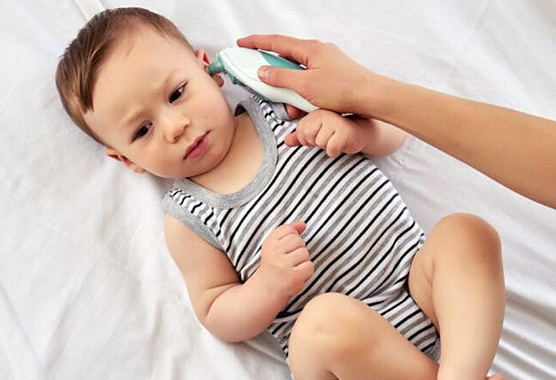RSV (Respiratory Syncytial Virus)
Severe RSV infections can be serious, especially in babies and older adults. Our infectious disease specialists use their expertise to manage severe RSV symptoms.
Medically reviewed by Dean Blumberg, M.D. on Aug. 25, 2023.

What Is RSV?
Respiratory syncytial virus (RSV) is a contagious virus that affects your breathing (respiratory system). It’s a common virus that many people get. Respiratory syncytial virus is seasonal and new RSV viruses spread each year.
RSV is most dangerous in children under age two and in adults ages 65 and older. Adults with a weakened immune system are also at higher risk for complications from RSV.
When RSV symptoms are severe, look to the infectious disease specialists at UC Davis Health. Our experts offer treatment to manage complications and help you breathe freely.
Respiratory Syncytial Virus (RSV) Symptoms
RSV (Respiratory Syncytial Virus): What Parents Should Know - Symptoms, Treatment and Complications
RSV symptoms may be mild or severe.
Common Symptoms
Most adults who get RSV have typical cold symptoms. Symptoms typically last less than a week, but may last for a week or two and include:
- Congestion
- Cough
- Fatigue
- Headache
- Mild fever
- Runny nose
- Sore throat
Emergency Symptoms
Severe RSV symptoms in adults and children may become life threatening. Seek emergency medical care if you have:
- Cough that worsens or won’t stop
- Flu-like symptoms
- Trouble breathing (shortness of breath)
- Skin that turns a bluish color
- Wheezing
RSV Causes
RSV is the virus that causes infection. Viruses spread from person to person in different ways, including through:
Air
If you’re near a person infected with RSV, you may inhale droplets that contain respiratory syncytial virus. When they cough or sneeze, you can breathe in these droplets.
Physical Contact
Hugging, kissing or shaking hands with someone who has RSV puts you at risk.
Touching Infected Surfaces
Dried secretions from an infected person’s nose or mouth can spread the virus. When you touch these secretions and then touch your eyes, nose or mouth, you may become infected.
Risk Factors for Severe RSV
You may be at higher risk for developing severe RSV if you have any of these risk factors.
Very Young or Older Age
Infants 6 months or younger and adults 65 and older are more likely to develop severe RSV.
Heart Disease
Heart disease, including congestive heart failure, may make RSV infections more severe.
Lung Disease
RSV may be severe if you have chronic conditions that affect your lungs. Lung conditions include asthma and chronic obstructive pulmonary disease (COPD).
Weakened Immune System
You’re more likely to develop severe RSV if you have a weakened immune system (are immunocompromised).
Diagnosing RSV
If you have mild RSV symptoms, you may think it’s just a cold. But if your symptoms are severe, certain tests can confirm RSV.
Providers at UC Davis Health take a sample of fluid from your nose. We may perform a:
- Rapid RSV test: We test the fluid sample for proteins called antigens. When these proteins are present, health care providers can quickly confirm that you have RSV.
- Polymerase chain reaction (PCR) test: Providers test fluid samples to detect RSV DNA.
Treatments for RSV
Routine antiviral therapy is not recommended for RSV. But treatment can help ease your symptoms. The infectious disease specialists at UC Davis Health are experts in treating severe RSV in babies, children and adults. We provide:
Fluids
Drink plenty of fluids to stay hydrated.
Medication
Use over-the-counter pain relievers like acetaminophen and ibuprofen to help ease body aches and fever.
Rest
Get plenty of rest to help your body recover from RSV.
Saline Drops
Use saline drops to keep your nose moist and loosen mucus.
Severe RSV Treatments
IV Fluids
Extra fluids delivered through your veins (intravenously or IV) help prevent and manage dehydration.
Oxygen
A mask or tube provides extra oxygen to help you breathe easier.
Preventing RSV
Respiratory syncytial virus spreads quickly from person to person. But there are some steps you can take to prevent the spread of this common virus.
Cover Coughs and Sneezes
Sneeze into your elbow and cover your mouth when you cough to avoid spraying respiratory droplets.
Get Vaccinated
If you’re age 60 or older, talk to your health care provider about getting the RSV vaccine. A monoclonal antibody vaccine is recommended for infants younger than 8 months who are born during or entering their first RSV season. The vaccine is also recommended for infants and children ages 8-19 months who are at increased risk for severe RSV disease and are entering their second RSV season.
Keep Objects and Surfaces Clean
Dried secretions on objects like devices and surfaces like tables can make others sick.
Limit Physical Contact
If you’re feeling sick, avoid close contact with young infants and older people.
Wash Your Hands
Wash your hands frequently, especially before holding an infant or preparing food.
Wear a Mask
Consider wearing a mask when visiting infants and older people.
Hospitalizations of older adults
60K+Each year in the U.S.
Hospitalizations of children younger than 5
50–80KEach year in the U.S.
Annual deaths
<10KOlder adults die because of RSV in the U.S.
Source: Centers for Disease Control and Prevention (CDC): Respiratory Syncytial Virus Infection (RSV) Older Adults
Request an Appointment
As Sacramento's No. 1 hospital, you'll benefit from unique advantages in primary care and specialty care. This includes prevention, diagnosis and treatment options from experts in 150 specialties.
Referring Physicians
To refer a patient, submit an electronic referral form or call.
800-4-UCDAVIS
Patients
Call to make an appointment.
Consumer Resource Center
800-2-UCDAVIS

Ranked among the nation’s best hospitals
A U.S. News & World Report best hospital in cardiology, heart & vascular surgery, diabetes & endocrinology, ENT, geriatrics, neurology & neurosurgery, and pulmonology & lung surgery.

Ranked among the nation’s best children’s hospitals
U.S. News & World Report ranked UC Davis Children’s Hospital among the best in pediatric nephrology, orthopedics*, and pulmonology & lung surgery. (*Together with Shriners Children’s Northern California)

Ranked Sacramento’s #1 hospital
Ranked Sacramento’s #1 hospital by U.S. News, and high-performing in aortic valve surgery, back surgery (spinal fusion), COPD, colon cancer surgery, diabetes, gynecological cancer surgery, heart arrhythmia, heart failure, kidney failure, leukemia, lymphoma & myeloma, lung cancer surgery, pacemaker implantation, pneumonia, prostate cancer surgery, stroke, TAVR, cancer, orthopedics, gastroenterology & GI surgery, and urology.

The nation’s highest nursing honor
UC Davis Medical Center has received Magnet® recognition, the nation’s highest honor for nursing excellence.

World-class cancer care
One of ~59 U.S. cancer centers designated “comprehensive” by the National Cancer Institute.

A leader in health care equality
For the 13th consecutive year, UC Davis Medical Center has been recognized as an LGBTQ+ Healthcare Equality Leader by the educational arm of America’s largest civil rights organization.



